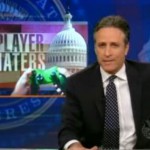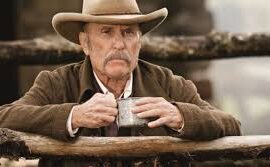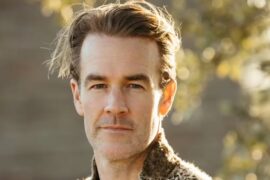 I don’t know if any of you out there are old enough to remember TV newscasts. They used to have them on at suppertime and later at the end of the night just before you went to bed. This was way back before we started getting the daily news from comedians.
I don’t know if any of you out there are old enough to remember TV newscasts. They used to have them on at suppertime and later at the end of the night just before you went to bed. This was way back before we started getting the daily news from comedians.
Anyway, back when TV was “wires and lights in a box” instead of gas or liquid crystals in a very thin rectangle, a guy by the name of Edward R. Murrow used to be the biggest name in television journalism. Today, Friday, April 25, marks what would have been his 100th birthday. Bob Edwards has a great piece about the occasion here at The Huffington Post.
Murrow made his reputation in radio in the ’40s as a CBS war correspondent. When he began his reports with the phrase “This is London,” North American listeners would stop and turn up their radios, anxious to hear the latest update on the war. When he reported on what he saw at the Buchenwald concentration camp in 1945–“rows of bodies stacked up like cord wood”–he unsettled many listeners. Good, said Murrow, who added he simply had no words for many of the atrocities he saw there.
Later, on TV in the ’50s, Murrow would continue to set the standard for network news reporting. He was a great communicator, commanding attention with his dramatic delivery but also with the precision of his words. My favorite scene in George Clooney’s “Good Night and Good Luck”–an inspired look back at Murrow’s celebrated stare down of Red Scare Senator Joseph McCarthy–is the long zoom in of Murrow at his typewriter, pounding out the copy that would pull McCarthy’s pants down for good. Here is the end of that speech from the movie, with David Strathairn channeling Murrow:
“Remember, we are not descended from fearful men,” Murrow wrote, as if he was addressing a North American gathering of newspaper and news room editors today. “We must not confuse dissent with disloyalty.” Murrow stood out because he stood for something, for integrity above all.
Of course, he was punished for his principles. A few years after taking on McCarthy, he was shoved to the sidelines at CBS. Around this time, when he did address a room full of news directors gathered in Chicago, he dared to suggest that “television in the main insulates us from the realities of the world in which we live.” That was in 1958.
What would he have made of prime time network TV today, not just of mind rotting junk like The Moment Of Truth or American Gladiators but of CNN and Fox News and the circus maximus that has become the marathon coverage of the U.S. primary elections? What would Murrow think about Jon Stewart or Stephen Colbert, exposing the truth behind the news but selling it for laughs? Would he be shocked that tragedy plus time equals comedy? Maybe he would get it. Certainly Bill Maher seems more in the tradition of Edward R. Murrow today than Katie Couric or Bill O’Reilly.
A heavy smoker, Murrow died at 57 in 1965. He lives on in the best TV has to offer today. Raise a toast and offer up his timeless salute: Good night, and good luck.







2 Comments
I’d like to think that Murrow would look on Colbert and Stewart as the only possible response to the devolution of discourse, fully in line with that Twain aphorism, “against the assault of laughter, nothing can stand.”
But then again, I think he’d have to conclude than in a sense, McCarthy and those like him had actually won. Not because of any notion of left or right wing — those constructs were getting limiting even in his time.
It’s more that the kind of appeal Murrow makes in Good Night and Good Luck wouldn’t work today, because it’s an appeal to the reasonable. It’s from a time when Republicans and Democrats sometimes worked across the aisle on things. It’s from a time when an argument was constructed and reframed based on dialogue and new information.
The twenty four hour news cycle hasn’t allowed for more debate. It’s only allowed for an echo chamber. Whether you’re on the left stripe or the right, you seek out the side that confirms your view, and you repeat the same talking points. People actually willing to move the ball down the field are few and far between. You see it here all the time. Ideology trumps all. I think Murrow would look at that world and he’d probably weep.
He’d also argue any of those chuckleheads, from either end of the spectrum, into the ground. And be amazed that it didn’t matter.
the CBC is full of chuckleheads and communists